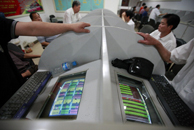|
![]()
| Economic growth and development Kwestie1 #121535 How can the benefits of a secure cyberspace for international economic growth and development be realised? | The internet is fostering economic growth and prosperity around the world. Banking, utility, manufacturing and retail companies increasingly rely on networked systems. 
The Internet is significantly increasing consumer choice, while encouraging competition, efficiency and innovation, and opening up new markets. Cyberspace has created a multi-billion dollar industry, employing millions. Expanding our networked world is in all our interest. It is estimated that for every 10% increase in broadband penetration, global GDP will increase by an average of 1.3%. The issues that the conference delegates will address will include: - Striking the right balance between protection of intellectual property and access, innovation and creation of markets
- How government regulation and industry self-regulation should work together
- The importance of transparency and predictability of regulatory and fiscal regimes, and their ability to adapt to fast-changing technologies.
Case Studies
|
+Citaten (2) - CitatenVoeg citaat toeList by: CiterankMapLink[2] The great transformer: The impact of Internet on economic growth and prosperity
Citerend uit: James Manyika, Charles Roxburgh - McKinsey Global Institute
Geciteerd door: David Price 8:52 PM 27 October 2011 GMT
Citerank: (15) 121826Enhanced productivity959C6EF, 121889Cultivate technological innovationAn environment that encourages innovation and entrepreneurship—including access to start-up capital, protection of intellectual property rights, support for R&D and , and world-class research universities and government-funded team–is vital to capturing Internet-related growth.109FDEF6, 121890Accessible, globally linked networksA solid internet infrastructure is a prerequisite for growth; creating the platforms upon which users and organizations experience the Internet and upon which entrepreneurs and businesses innovate.109FDEF6, 121905Two billion people are connected to the internet now109FDEF6, 121906Almost $8 trillion exchange hands each year through e-commerce109FDEF6, 121907Internet accounts for 3.4% of GDP in large and developed economiesInternet accounts for, on average, 3.4 percent of GDP across the large economies that make up 70 percent of global GDP.109FDEF6, 121908Internet sector GDP weight now greater than agriculture or utilities109FDEF6, 12190921% of mature economies GDP growth over past 5 years due to internetThe Internet accounted for 21 percent of the GDP growth in mature economies over the past 5 years.1198CE71, 121910Rising living standards linked to maturity of the Internet ecosystemThere is a clear connection between the maturity of the Internet ecosystem and rising living standards.1198CE71, 121911Transformed the value chain in almost all sectorsThe Internet has enabled fundamental business transformations that span the entire value chain in virtually all sectors and types of companies—not just online ones.959C6EF, 121912Internet creates more jobs than it eliminates959C6EF, 121913In France the Internet has created 2.4 jobs for every one eliminated Detailed analysis of the French economy showed that while the Internet is reported to have destroyed 500,000 jobs over the past 15 years, it created 1.2 million new ones, a net addition of 2.4 jobs for every one destroyed.1198CE71, 121914McKinsey’s global SME survey found 2.6 jobs created for each one lostMcKinsey’s global SME survey found that the Internet had created 2.6 jobs for every one destroyed.1198CE71, 121930Online prices are on average 10% lower than offline pricesPreliminary research shows online prices are, on average, 10% lower than their offline counterparts as a result of the price transparency that search tools offer. The economic surplus captured by consumers from web services alone ranges from $18 a month per user in Germany to $28 in the UK.1198CE71, 121935Foster competitionCountries that make their markets more open and competitive achieve greater productivity. Such competition ensures that the most innovative and productive companies create more attractive products and services for users and gain market share at the expense of the less productive.109FDEF6 URL:
| | Fragment- "In a paper prepared for the Foreign Commonwealth Office International Cyber Conference, MGI examines what more can be done to fully capture the benefits of the Internet.
The Internet is changing the way we work, socialize, create and share information, and organize the flow of people, ideas, and things around the globe. Yet the magnitude of this transformation is still underappreciated. The Internet accounted for 21 percent of the GDP growth in mature economies over the past 5 years. In that time, we went from a few thousand students accessing Facebook to more than 800 million users around the world, including many leading firms, who regularly update their pages and share content. While large enterprises and national economies have reaped major benefits from this technological revolution, individual consumers and small, upstart entrepreneurs have been some of the greatest beneficiaries from the Internet’s empowering influence. If Internet were a sector, it would have a greater weight in GDP than agriculture or utilities.
And yet we are still in the early stages of the transformations the Internet will unleash and the opportunities it will foster. Many more technological innovations and enabling capabilities such as payments platforms are likely to emerge, while the ability to connect many more people and things and engage them more deeply will continue to expand exponentially.
As a result, governments, policy makers, and businesses must recognize and embrace the enormous opportunities the Internet can create, even as they work to address the risks to security and privacy the Internet brings. As the Internet’s evolution over the past two decades has demonstrated, such work must include helping to nurture the development of a healthy Internet ecosystem, one that boosts infrastructure and access, builds a competitive environment that benefits users and lets innovators and entrepreneurs thrive, and nurtures human capital. Together these elements can maximize the continued impact of the Internet on economic growth and prosperity." |
|
|